- Home
- Stephanie Laurens
On a Wild Night Page 13
On a Wild Night Read online
Page 13
Amanda’s eyes nearly started from her head. The woman’s gown . . . the bodice was transparent. Her breasts, nipples erect, were displayed for all to see. A number of gentlemen were looking.
Her faint “Good God!” was overridden by Dexter’s much more decisive “Come on.”
He whisked her around; holding her close, he steered her in the opposite direction.
Scanning the crowd, Martin mentally cursed. The waltz had distracted him; he’d missed the moment he’d been watching for—the moment when, by general consensus, the tenor of the evening changed. From the licentious to the determinedly bawdy. From what he could see as he glanced about, matters would soon descend to the outright lewd.
The change had happened early tonight, as it sometimes did. Normally, he would retire to his box with whichever lady he had on his arm, there to indulge as they would in privacy; over the past year he might have eschewed the ton, but he hadn’t lived the life of a monk.
Tonight, however, celibacy was definitely his fate. As he bundled Amanda up the stairs to their box, the idea of spending any length of time with her there, alone, his behavior rigidly correct when what he wanted to do—
He cut off the thought with another mental curse.
She stepped into the box. Before he could stop her, she went straight to the front and looked out. “Great heavens!” After scanning the throng, her gaze fixed on one spot. Her jaw fell. “Good Lord—look at that!”
He didn’t need to; she didn’t, either. Martin grasped her elbow—
A muffled shriek jerked their attention to the next box. Other sounds followed—panting, incoherent exclamations, garbled directions. Martin gave thanks that the occupants had had the foresight to draw the curtains. Tightening his grip, he drew Amanda back. “Come on—we’re leaving.”
“Leaving? But—”
“No.”
On that uncompromising syllable, Amanda found herself drawn irresistibly to the door. One part of her wanted to dig in her heels; this was her last night with him, her last chance at him, and he was cutting it short. On the other hand, the venue had not proven as amenable as she’d hoped—not romantic, not subtly seductive—not subtle at all. Subtle was what she needed, she was sure of that.
The behavior of the revellers they passed as Dexter grimly escorted her out of the building reinforced the notion that Covent Garden was the wrong place for her purposes. Fighting her blushes, disguising her shock, was too distracting; she needed her wits about her.
She was actually relieved when Dexter handed her into his carriage, but she had no time to relax, although she pretended to do so when the door shut and he sat beside her. The carriage rocked, rolled forward. She glanced at the street and racked her brains for inspiration. She’d got him where she’d hoped to get him—burning with desire for her. But how to capitalize when he was so determined to resist? How to snatch victory from his jaws?
The horses clopped along Pall Mall as she frantically searched for some way to prolong her time with him. Tried to think what she could do to further weaken his defenses; if he escaped her now in the mood in which he presently was, she would not, she felt sure, see him again. The carriage passed St. James; the dark shadows of Green Park lay ahead. Amanda glimpsed them, and suddenly knew what to do. A sense of calm descended; she waited until the carriage had turned into the street bordering the park before glancing at Dexter. “It’s still early, the night’s mild. Can we walk in Green Park for a while?”
Martin looked at the park, designed for strolling, gravel walks spread beneath tall trees. During the day, it was the preferred venue of governesses and nursemaids with young children; by night, it was deserted. It was free space, not fenced; safe enough given it was all lawns and trees, no bushes or anywhere any miscreant could hide.
“I did expect a whole evening at Covent Garden. However . . .” Amanda shrugged as he glanced at her. “In the circumstances, let’s stroll under the trees and I’ll be satisfied.”
He smothered a “humph,” yet it was a reasonable suggestion. That he was acutely conscious that this would otherwise be his last moments with her—that strolling in the park would put off the instant when he would bid her good-bye for the last time—he steadfastly ignored, along with the unwelcome yearning that he could instead keep her, take her to his house and shut her in his library, his to enjoy for all time.
Jaw setting, he shook aside the thought. “Very well.”
At his direction, the carriage pulled up by the verge; he descended, handed Amanda down, then helped her change the domino for her velvet cloak. Knotting the ties at her throat, she left the cloak partly open, revealing the warm hue of her gown. Even more to his silent approval, she left the hood down, so her lustrous curls sheened in the weak light.
His fingers itched to touch. Instead, he reached for her hand, twined her arm with his, and they set off down the nearest path.
Amanda accepted his silence without comment; she’d realized he used the tactic to keep people at a distance, but she knew how to slip through his guard. They strolled under the trees, in and out of the shadows. She waited until they were deep within the park, out of sight of his coachman.
Then she drew her hand from his arm and stepped across him. Let him walk into her, let him catch her to him, his hands on her gown beneath her cloak. Smiling, she laid her palm to his cheek, stretched up and set her lips to his.
It wasn’t a “thank you” kiss, but she hoped he might think so long enough to give her the opening she needed. Whether he was fooled or simply surprised, she gained the breach she wanted—his lips met hers easily, readily.
She seized the moment, seized control of the kiss.
He’d kissed her often enough for her to understand how to be brazen and bold. Their lips merged; her tongue sought his, found, stroked, tangled. Winding her arms about his neck, she stretched up, pressed herself to him.
His hands tightened about her waist, fingers gripping as if to put her from him. She angled her lips, pressed the kiss deeper, fanned the flames licking between them . . . and the moment passed. His hands eased, then, hesitantly, as if he’d lost direction, they slid over her back, his touch gentle, wondering.
The advantage was hers. She wasn’t about to let it slide, not before she made it clear just where they stood, just what she was offering.
Herself.
She let the fact infuse her kiss, let that truth ring clearly as she sank against him. He didn’t seize, but gathered her to him as if she were delicate porcelain, something he feared to break. She pressed closer yet, as if to prove him wrong.
Suddenly, the kiss changed.
Shifted to a plane different from any she’d previously been on, a place of whirling pleasures, a kaleidoscope of sensual delight. He drew her deeper, then returned the pleasure she’d been lavishing on him, with interest. Yet something had changed. He wanted her, but it wasn’t ravenous desire that drove him. The restraint that had earlier held him back was gone, yet some barrier still stood between them—between her needs and his, barring their mutual fulfillment.
It was his needs that had changed, or rather, clarified. She could taste it in the way his lips took hers, in the languid, unhurried, wondrous depths of their kiss. In the gentle way he held her, in the subtle coaxing that had her head spinning, in the hesitant, reluctant acknowledgment of the possibility that lay between them.
Deep in the kiss, wrapped in his arms, she suddenly saw—suddenly understood. He wanted her not just sexually, but with a deeper, richer, infinitely more alluring need. No simple desire but something profound, the sleeping heart of her lion.
She saw, and wanted—reached with both hands . . .
Only to sense his retreat.
Gradual, as reluctant as he’d been to be lured forth in the first place, yet step by step he eased back from the kiss, backed out of the trap she’d set. The trap she’d baited with herself.
“No.” Martin whispered the word as he ended the kiss. His head was spinning, his body one
massive ache. An ache so profound, one that went so much deeper than muscle and bone.
He hadn’t believed she could do it, or even that she would try. Her wordless plea—one he couldn’t pretend he didn’t comprehend—had struck straight through every barrier he’d erected over the last ten years. He’d seen the pit yawning at his feet on the first night they’d met, but he’d thought himself safe, his defenses too seasoned and sound for her to dent seriously.
Instead, she’d laid them waste, and left him feeling more exposed than he’d ever felt before. Mentally groping in the dark for some remnants of his shields behind which to hide.
He looked down at her face, into her eyes. She’d chosen her spot so they weren’t in shadow; by the weak light of the stars, he could read the confusion, the disbelief, the incipient hurt he knew he had to cause.
That last moved him to state, “You are what I can never have.”
He had no idea what she could read in his face; her eyes raced over his features, then returned to his eyes.
“Why?”
Not a demand, not the beginning of a tantrum, but a simple request born of a need to understand.
He’d never answered that question, not for any of the ladies with whom, over the last year, he had on occasion shared a bed. They’d had no right to know, no claim on the knowledge; they had never offered him half as much as she. Even if he hadn’t taken. “I killed a man. Or so society believes.”
She didn’t blink, simply studied his eyes; not a single muscle in the body cradled in his arms tensed. “And did you?”
His lips twisted with the bitterness he found he couldn’t hide. “No.”
She considered him for a moment more, then eased back until she was standing within the circle of his arms. “Tell me.”
It was his turn to consider, then he drew a deep breath. Behind her, a wrought-iron seat caught his eye. “Let’s sit.”
They did, she sitting forward so she could see his face as he leaned his forearms on his thighs, clasped his hands. And looked back.
When, sucked into his darkest memories, he said nothing, she prompted, “I heard you seduced some girl.”
He hesitated, then said, “That’s was part of the story, but equally untrue.” After a moment, he continued, “There was a girl in the village near my home. We grew up together—I was an only child and saw her as a younger sister. One day, she killed herself, driven to it by her father—a righteous old sod—because she was with child. I was nineteen at the time, and spent most of my days in London. I learned of her death on a visit home. Swearing vengeance, I went in search of her father. I found him. He’d been pushed off a cliff, then his head had been bashed with a rock. I picked up the rock—I wasn’t sure . . . that’s how the villagers found me, standing there with the rock in my hand.”
“They thought you’d killed him?”
“The blacksmith had seen a gentleman he took for me struggling with the old man at the top of the bluff—saw me, as he thought, pitch the old man over.”
“But it wasn’t you.”
No question. Her hand came to rest, warm and alive, on his sleeve.
“No, and of course I denied it.” He drew in a long breath. “No one believed me.” That, of it all, despite all the years, still hurt unbearably. “My father”—he paused to make sure his voice remained steady—“accepted all that was said as the truth. He wanted to disown me, but because of the title and the family line, he banished me instead. As his heir, I was bundled off abroad instead of being allowed to face any investigation.”
She was silent for a long time; he didn’t have the strength, couldn’t find the words, to end the moment and bring on the time when they would part.
“Did you never try to set the record straight?”
“My father’s edict was that I should not set foot in England as long as he lived. I honored that to the letter.”
“And more, so I heard.”
“Ten years have elapsed since he passed judgment on me. Any chance of proving the truth died long ago.” Along with any chance of him being considered an eligible parti for such as she; until now, that hadn’t bothered him in the least.
The thought propelled him to his feet. He glanced down at her, held out a hand. “Come. I’ll take you home.”
Amanda looked up at him, considered, not him, but how best to proceed. She knew better than to brush aside his reasoning; she was too much of his world, understood too well the situation as he saw it.
She understood, too, that he saw this moment as a final parting. She didn’t agree, but she couldn’t argue, not until she’d marshaled more support for her cause. Placing her fingers in his, she rose; arm in arm, they strolled back along the path.
They were almost to the carriage when she halted in the shadows, waited until he stopped and faced her. One hand in his, she stepped closer, with her other hand drew his lips to hers. He was wary, but permitted it—she kissed him sweetly, lingeringly, the merest echo of what had passed between them before.
“Thank you for telling me.”
She whispered the words as their lips parted, then stepped back. For a long moment, he stood looking down at her, his face and eyes too deeply shadowed for her to read. His grip on her hand tightened, then abruptly eased.
With the merest inclination of his head, he led her to the waiting carriage.
She’d snared her lion only to find him wounded. For the moment, he could return to his lair, but she hadn’t given up her dream. Indeed, after their stroll in Green Park, giving up was the furthest notion from her mind.
“I need to learn more.” Standing with Amelia by the side of Lady Moffat’s ballroom, Amanda scanned the crowd. “I need to know if it is as he says, and people believe he’s a murderer.”
Amelia slanted her a glance. “You’re sure he isn’t?”
“One needs only to meet him to know the idea’s ludicrous, but with him refusing to allow anyone a chance to reassess, society’s unlikely to change its collective mind.”
“True. But I’ve never heard a whisper about murder before. It’s always been something about his amorous propensities.”
“Indeed, but given those are real enough, it’s possible the murder was always there, but those warning us declined to sully our delicate ears with the tale.”
“That, unfortunately, is perfectly likely.”
“So I need to learn the truth as society sees it. I can’t pretend I’m willing to throw my cap over the windmill regardless of his status—he won’t accept that.” Amanda looked around. “The question is: who to ask?”
“Aunt Helena?”
“She’ll see straight through me, and might warn Mama.”
“I should think Honoria would be difficult for the same reason.”
“And it was ten years ago—I don’t think Honoria would know.”
Amelia joined Amanda in assessing the company. “Not so easy. You need someone who would know the details of such an old scandal—”
“Details that would have been at least partly suppressed.”
“And they need to remember accurately.”
“Indeed . . .” Amanda stopped, her gaze resting on the one person who might well be the perfect source.
Amelia followed her gaze, nodded decisively. “Yes. If anyone can help, she’s the one.”
“And she’s far less likely to thrust a spoke in my wheel.” Amanda set off across the ballroom, evading all those who wanted to chat. She had to wait, hovering beside the chaise, until a matron who’d been seeking support for her daughter’s come-out departed.
Quickly, Amanda took her place, skirts swishing as she sat.
Lady Osbaldestone bent her obsidian gaze upon her, regarding her with considerably greater interest than she had the earnest matron. “Well, gel? You ain’t pregnant, are you?”
Amanda stared, then stated, commendably evenly, “No.”
“Ah, well—daresay there’s hope yet.”
Amanda grabbed her courage with both hands. “A
s to that . . . I wanted to ask if you recalled the details of an old scandal.”
The black eyes fixed on her face with unnerving intensity. “How old?”
“Ten years.”
Lady Osbaldestone’s eyes narrowed. “Dexter,” she pronounced.
Amanda jumped.
“Good God, gel! Don’t tell me you’ve succeeded where all others have failed?”
She was torn between claiming the crown and denying all knowledge. “Possibly,” she temporized. “But I was wondering about the scandal. All we ever heard was he seduced some girl who then killed herself, but I’ve learned there was a murder involved.”
“Learned that, have you? From whom, I wonder? There wouldn’t be many ready to bandy that fact about.”
“Oh?” She made her expression as innocently inquiring as she could.
Lady Osbaldestone snorted. “Very well—the real tale, then, as you seem to have a need to know. What the ton heard was that Dexter seduced a local girl—the family estate is in the Peak district. The gel fell pregnant, but rather than send to Dexter, she told her father, a religious sort. The father hounded her—she ended taking her own life. Dexter heard of it on his next visit home. He set out to look for the gel’s father, and, so we heard, murdered him, then stupidly stood around until the villagers found him.
“Old Dexter—the present one’s father—was horrifed. He would have disowned his son, but the title and estate would have reverted to the crown. Add to that, the countess doted on her son—her one and only chick—and Dexter doted on his countess. Letting the lad stand his trial was out of the question, at least, it was in those days. So he was banished while his father lived. That was what we in London heard.” Lady Osbaldestone folded her hands over her ample waist. “What we believed . . . that’s another matter.”
“The ton didn’t believe he—the present earl—was the murderer?”
Lady Osbaldestone frowned. “More accurate to say that judgment was reserved. Dexter, the present one, might have been a hothead, a wild and tempestuous youth, but he’d never struck any of us as a bad apple.”

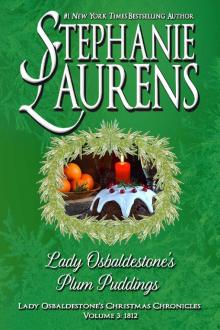 Lady Osbaldestone’s Plum Puddings: Lady Osbaldestone’s Christmas Chronicles Volume 3
Lady Osbaldestone’s Plum Puddings: Lady Osbaldestone’s Christmas Chronicles Volume 3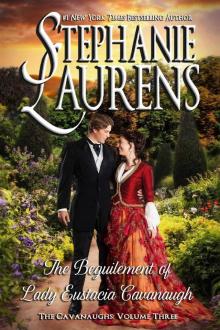 The Beguilement of Lady Eustacia Cavanagh: The Cavanaughs Volume 3
The Beguilement of Lady Eustacia Cavanagh: The Cavanaughs Volume 3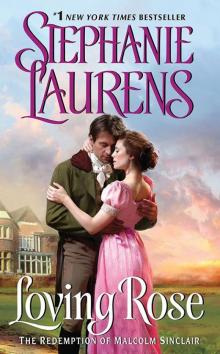 Loving Rose: The Redemption of Malcolm Sinclair (Casebook of Barnaby Adair)
Loving Rose: The Redemption of Malcolm Sinclair (Casebook of Barnaby Adair)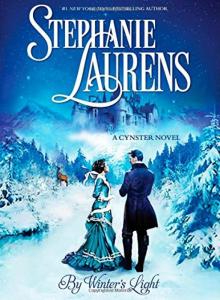 By Winter's Light
By Winter's Light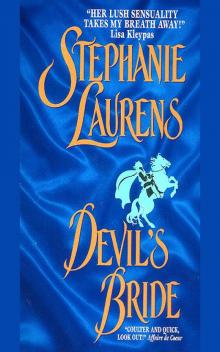 Devil's Bride
Devil's Bride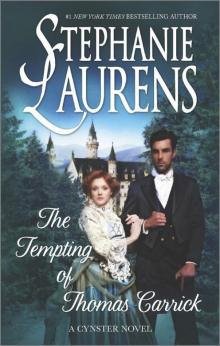 The Tempting of Thomas Carrick
The Tempting of Thomas Carrick![Cynster [22.00] A Match for Marcus Cynster Read online](http://i1.bookreadfree.com/i/03/16/cynster_[22_00]_a_match_for_marcus_cynster_preview.jpg) Cynster [22.00] A Match for Marcus Cynster
Cynster [22.00] A Match for Marcus Cynster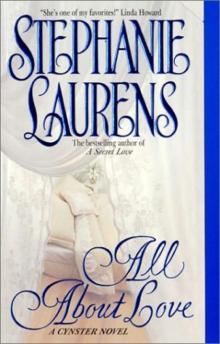 All About Love c-6
All About Love c-6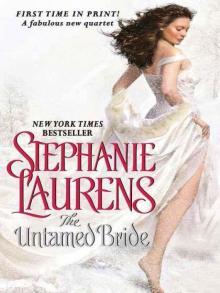 Cobra 01 The Untamed Bride
Cobra 01 The Untamed Bride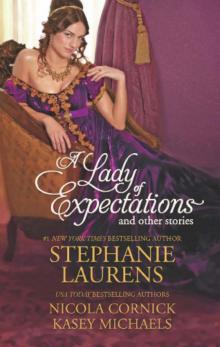 A Lady of Expectations and Other Stories
A Lady of Expectations and Other Stories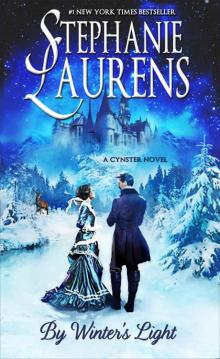 By Winter's Light_A Cynster Novel
By Winter's Light_A Cynster Novel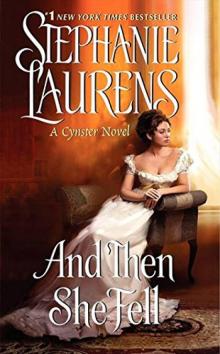 And Then She Fell
And Then She Fell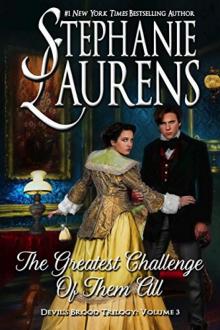 The Greatest Challenge of Them All
The Greatest Challenge of Them All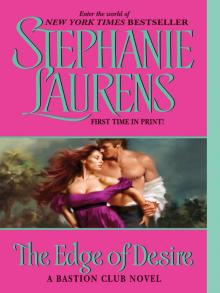 The Edge of Desire
The Edge of Desire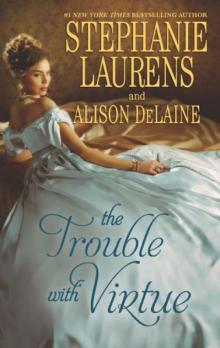 The Trouble With Virtue: A Comfortable WifeA Lady by Day
The Trouble With Virtue: A Comfortable WifeA Lady by Day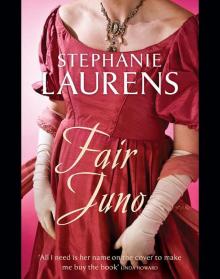 Fair Juno
Fair Juno THE LEGEND OF NIMWAY HALL: 1750 - JACQUELINE
THE LEGEND OF NIMWAY HALL: 1750 - JACQUELINE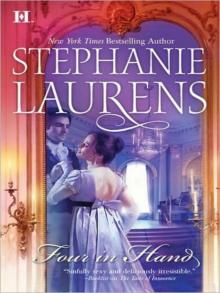 Four In Hand
Four In Hand The Reckless Bride
The Reckless Bride Stephanie Laurens Rogues' Reform Bundle
Stephanie Laurens Rogues' Reform Bundle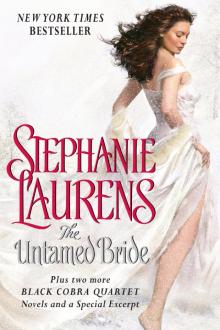 The Untamed Bride Plus Black Cobra 02-03 and Special Excerpt
The Untamed Bride Plus Black Cobra 02-03 and Special Excerpt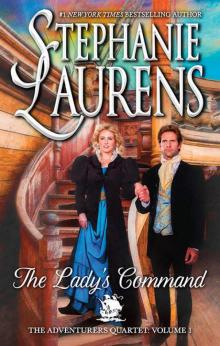 The Lady's Command (Adventurers Quartet #1)
The Lady's Command (Adventurers Quartet #1)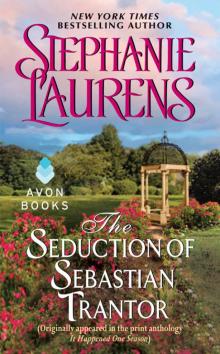 The Seduction of Sebastian Trantor
The Seduction of Sebastian Trantor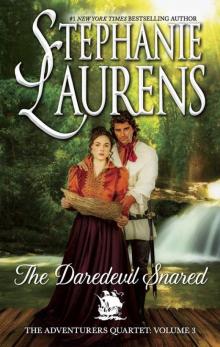 The Daredevil Snared (The Adventurers Quartet Book 3)
The Daredevil Snared (The Adventurers Quartet Book 3)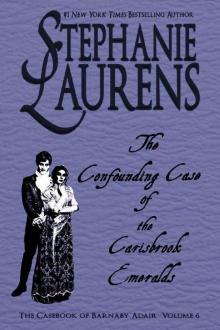 The Confounding Case Of The Carisbrook Emeralds (The Casebook of Barnaby Adair 6)
The Confounding Case Of The Carisbrook Emeralds (The Casebook of Barnaby Adair 6) Lord of the Privateers (The Adventurers Quartet)
Lord of the Privateers (The Adventurers Quartet)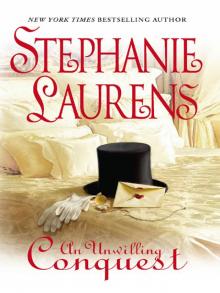 An Unwilling Conquest
An Unwilling Conquest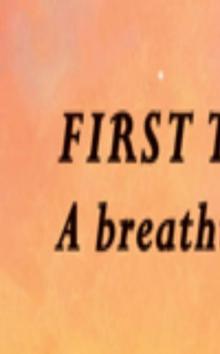 Brazen Bride
Brazen Bride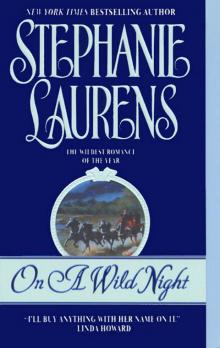 On a Wild Night
On a Wild Night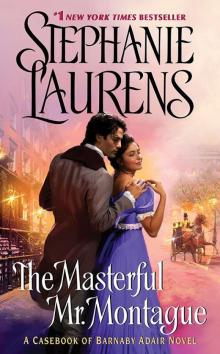 The Masterful Mr. Montague: A Casebook of Barnaby Adair Novel
The Masterful Mr. Montague: A Casebook of Barnaby Adair Novel Lord of the Privateers
Lord of the Privateers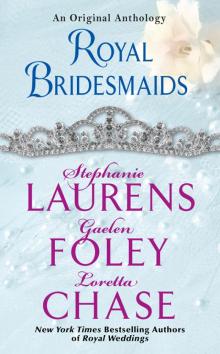 Royal Bridesmaids
Royal Bridesmaids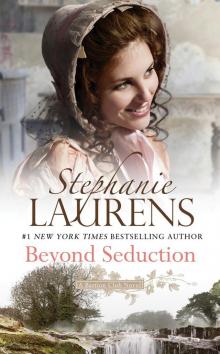 Beyond Seduction
Beyond Seduction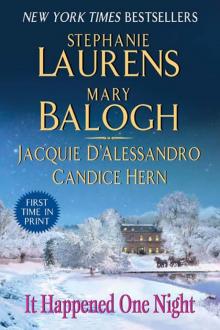 It Happened One Night
It Happened One Night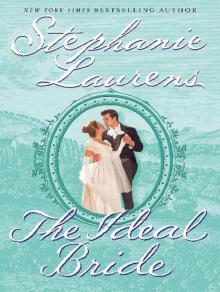 The Ideal Bride
The Ideal Bride The Promise in a Kiss
The Promise in a Kiss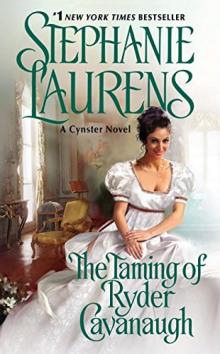 The Taming of Ryder Cavanaugh
The Taming of Ryder Cavanaugh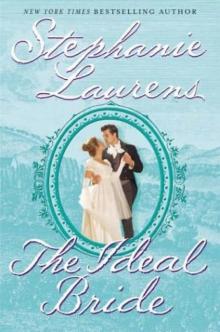 The Ideal Bride c-12
The Ideal Bride c-12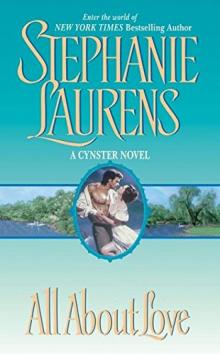 All About Love
All About Love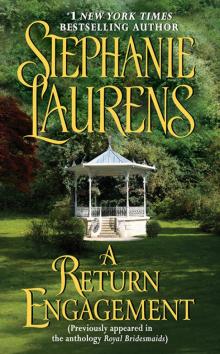 A Return Engagement
A Return Engagement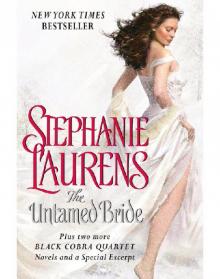 The Untamed Bride Plus Two Full Novels and Bonus Material
The Untamed Bride Plus Two Full Novels and Bonus Material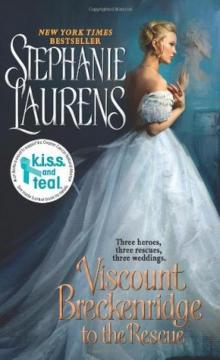 Viscount Breckenridge to the Rescue
Viscount Breckenridge to the Rescue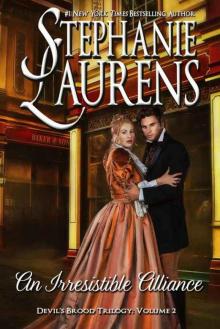 An Irresistible Alliance (Cynsters Next Generation Novels Book 5)
An Irresistible Alliance (Cynsters Next Generation Novels Book 5)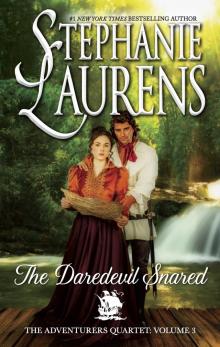 The Daredevil Snared
The Daredevil Snared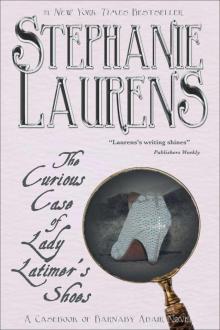 The Curious Case of Lady Latimer's Shoes: A Casebook of Barnaby Adair Novel
The Curious Case of Lady Latimer's Shoes: A Casebook of Barnaby Adair Novel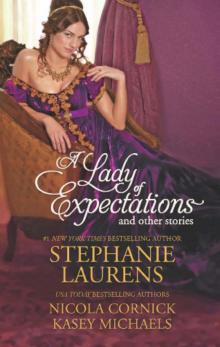 A Lady of Expectations and Other Stories: A Lady of ExpectationsThe Secrets of a CourtesanHow to Woo a Spinster
A Lady of Expectations and Other Stories: A Lady of ExpectationsThe Secrets of a CourtesanHow to Woo a Spinster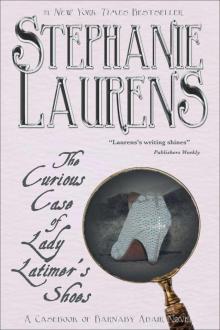 The Curious Case of Lady Latimer's Shoes: A Casebook of Barnaby Adair Novel (The Casebook of Barnaby Adair)
The Curious Case of Lady Latimer's Shoes: A Casebook of Barnaby Adair Novel (The Casebook of Barnaby Adair)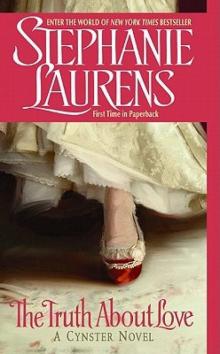 The Truth About Love
The Truth About Love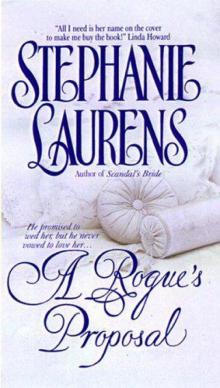 A Rogue's Proposal
A Rogue's Proposal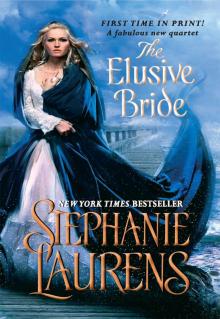 The Elusive Bride
The Elusive Bride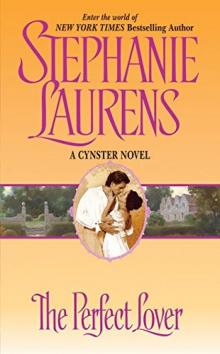 The Perfect Lover
The Perfect Lover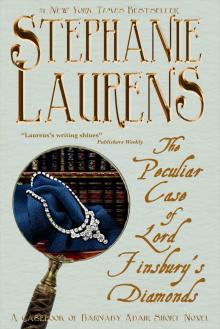 The Peculiar Case of Lord Finsbury's Diamonds: A Casebook of Barnaby Adair Short Novel
The Peculiar Case of Lord Finsbury's Diamonds: A Casebook of Barnaby Adair Short Novel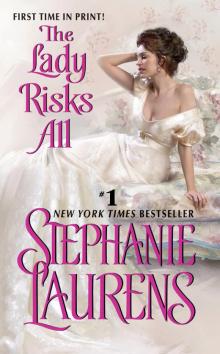 The Lady Risks All
The Lady Risks All The Murder at Mandeville Hall: The Casebook of Barnaby Adair: Volume 7
The Murder at Mandeville Hall: The Casebook of Barnaby Adair: Volume 7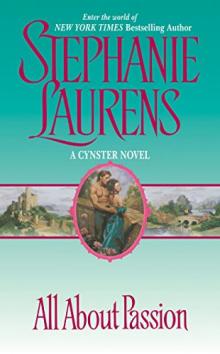 All About Passion
All About Passion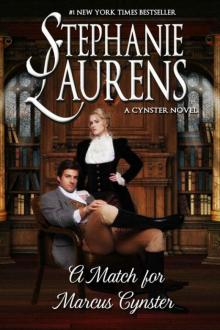 A Match for Marcus Cynster
A Match for Marcus Cynster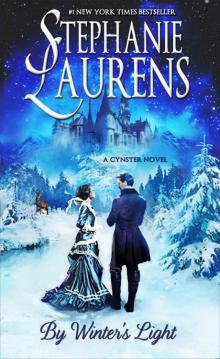 By Winter's Light: A Cynster Novel (Cynster Special Book 2)
By Winter's Light: A Cynster Novel (Cynster Special Book 2)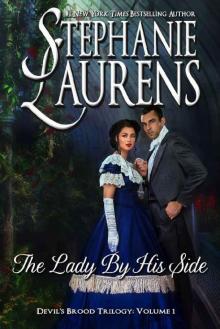 The Lady By His Side
The Lady By His Side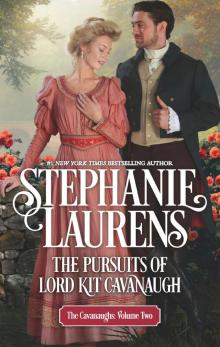 The Pursuits of Lord Kit Cavanaugh
The Pursuits of Lord Kit Cavanaugh Tangled Reins
Tangled Reins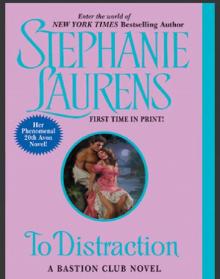 To Distraction
To Distraction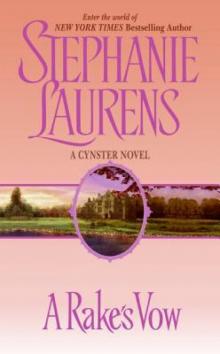 A Rake's Vow
A Rake's Vow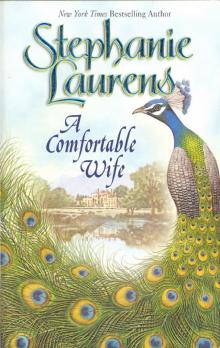 A Comfortable Wife
A Comfortable Wife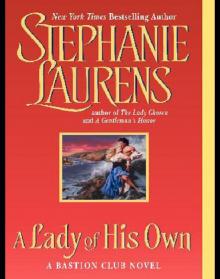 A Lady of His Own bc-3
A Lady of His Own bc-3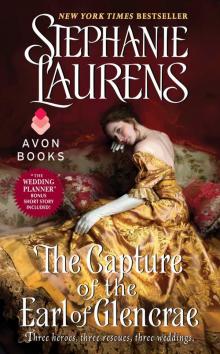 The Capture of the Earl of Glencrae
The Capture of the Earl of Glencrae Scandals Bride c-3
Scandals Bride c-3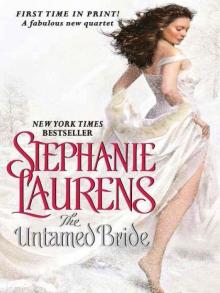 Untamed Bride
Untamed Bride The Brazen Bride
The Brazen Bride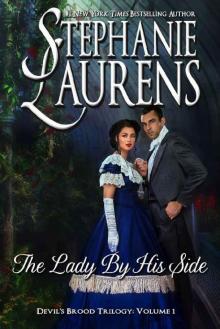 The Lady By His Side (Cynsters Next Generation Novels Book 4)
The Lady By His Side (Cynsters Next Generation Novels Book 4)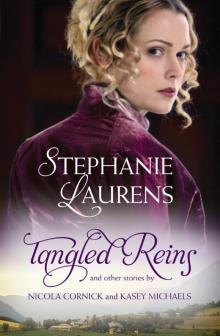 Tangled Reins and Other Stories
Tangled Reins and Other Stories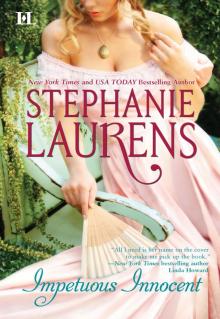 Impetuous Innocent
Impetuous Innocent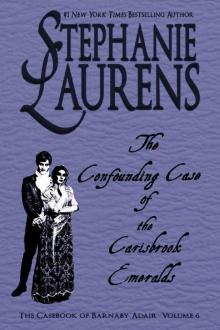 The Confounding Case Of The Carisbrook Emeralds
The Confounding Case Of The Carisbrook Emeralds Stephanie Laurens - B 6 Beyond Seduction
Stephanie Laurens - B 6 Beyond Seduction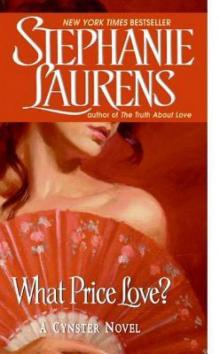 What Price Love?
What Price Love?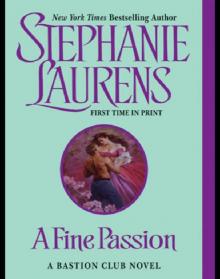 A Fine Passion
A Fine Passion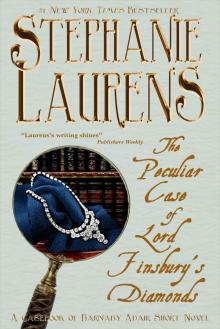 The Peculiar Case of Lord Finsbury's Diamonds: A Casebook of Barnaby Adair Short Novel (The Casebook of Barnaby Adair)
The Peculiar Case of Lord Finsbury's Diamonds: A Casebook of Barnaby Adair Short Novel (The Casebook of Barnaby Adair) Where the Heart Leads
Where the Heart Leads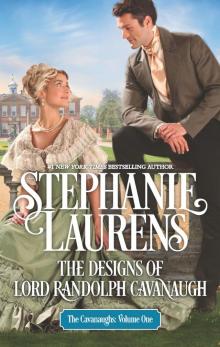 The Designs of Lord Randolph Cavanaugh
The Designs of Lord Randolph Cavanaugh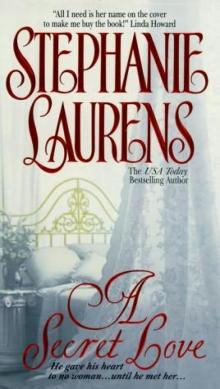 A Secret Love c-5
A Secret Love c-5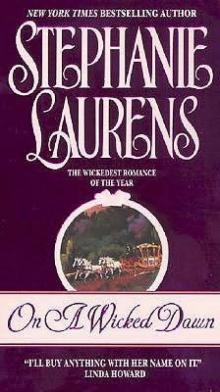 On a Wicked Dawn c-10
On a Wicked Dawn c-10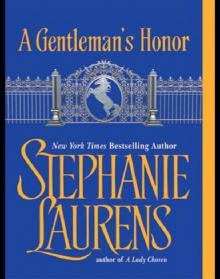 A Gentleman's Honor
A Gentleman's Honor THE LEGEND OF NIMWAY HALL_1750_JACQUELINE
THE LEGEND OF NIMWAY HALL_1750_JACQUELINE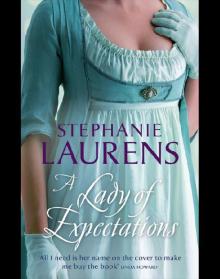 A Lady of Expectations
A Lady of Expectations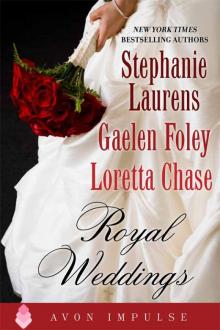 Royal Weddings: An Original Anthology
Royal Weddings: An Original Anthology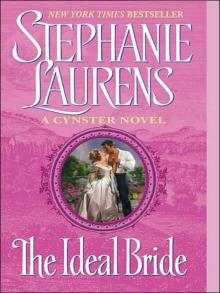 The Ideal Bride (Cynster Novels)
The Ideal Bride (Cynster Novels) Mastered by Love
Mastered by Love A Buccaneer at Heart
A Buccaneer at Heart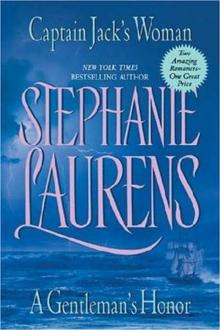 Captain Jack’s Woman / A Gentleman's Honor
Captain Jack’s Woman / A Gentleman's Honor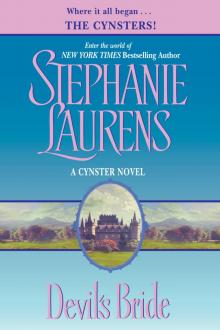 Devil's Bride with Bonus Material
Devil's Bride with Bonus Material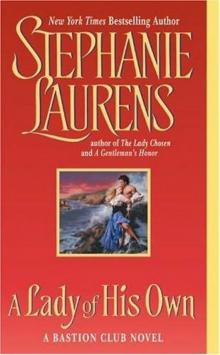 A Lady of His Own
A Lady of His Own A Secret Love
A Secret Love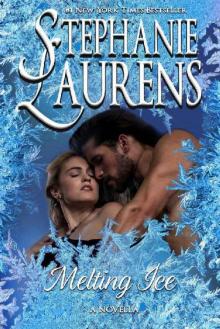 Melting Ice
Melting Ice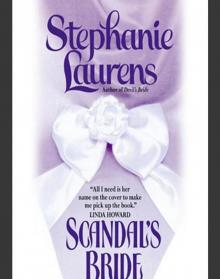 Scandal's Bride
Scandal's Bride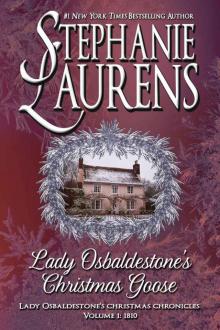 Lady Osbaldestone’s Christmas Goose
Lady Osbaldestone’s Christmas Goose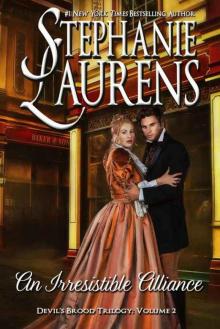 An Irresistible Alliance
An Irresistible Alliance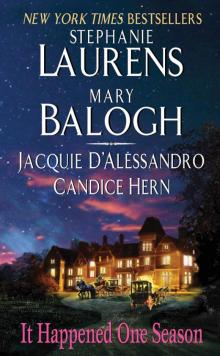 It Happened One Season
It Happened One Season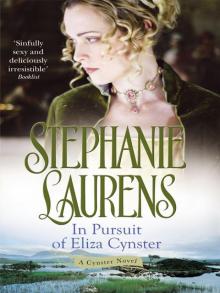 In Pursuit Of Eliza Cynster
In Pursuit Of Eliza Cynster Captain Jack's Woman
Captain Jack's Woman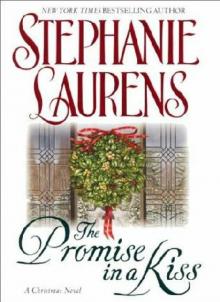 The promise in a kiss c-8
The promise in a kiss c-8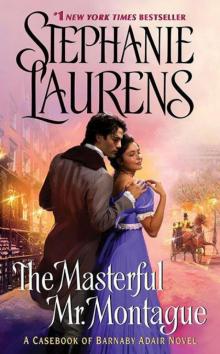 The Masterful Mr. Montague
The Masterful Mr. Montague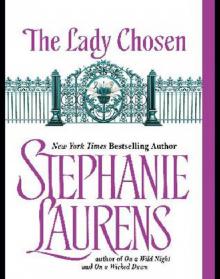 The Lady Chosen
The Lady Chosen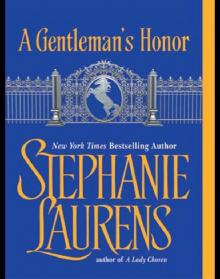 A Gentleman's Honor bc-2
A Gentleman's Honor bc-2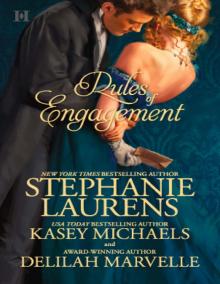 Rules of Engagement: The Reasons for MarriageThe Wedding PartyUnlaced (Lester Family)
Rules of Engagement: The Reasons for MarriageThe Wedding PartyUnlaced (Lester Family) Secrets of a Perfect Night
Secrets of a Perfect Night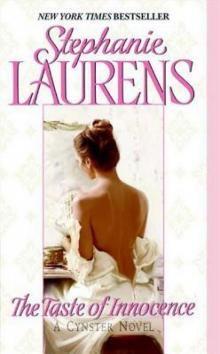 The Taste of Innocence
The Taste of Innocence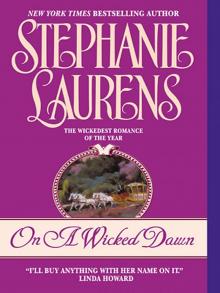 On A Wicked Dawn
On A Wicked Dawn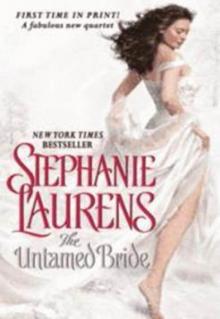 The Untamed Bride
The Untamed Bride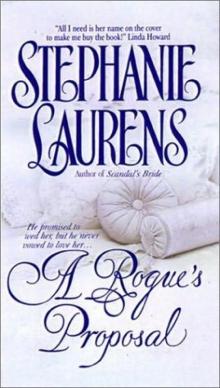 A Rogues Proposal c-4
A Rogues Proposal c-4 Rakes Vow c-2
Rakes Vow c-2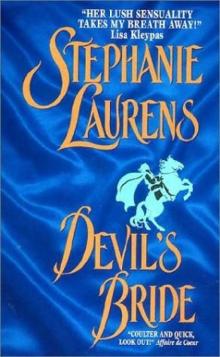 Devils Bride c-1
Devils Bride c-1 Hero, Come Back
Hero, Come Back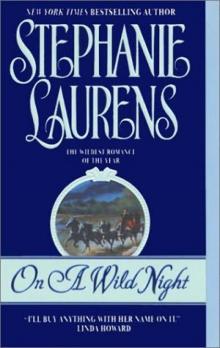 On a Wild Night c-8
On a Wild Night c-8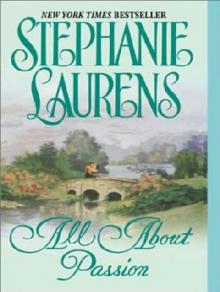 All About Passion c-7
All About Passion c-7